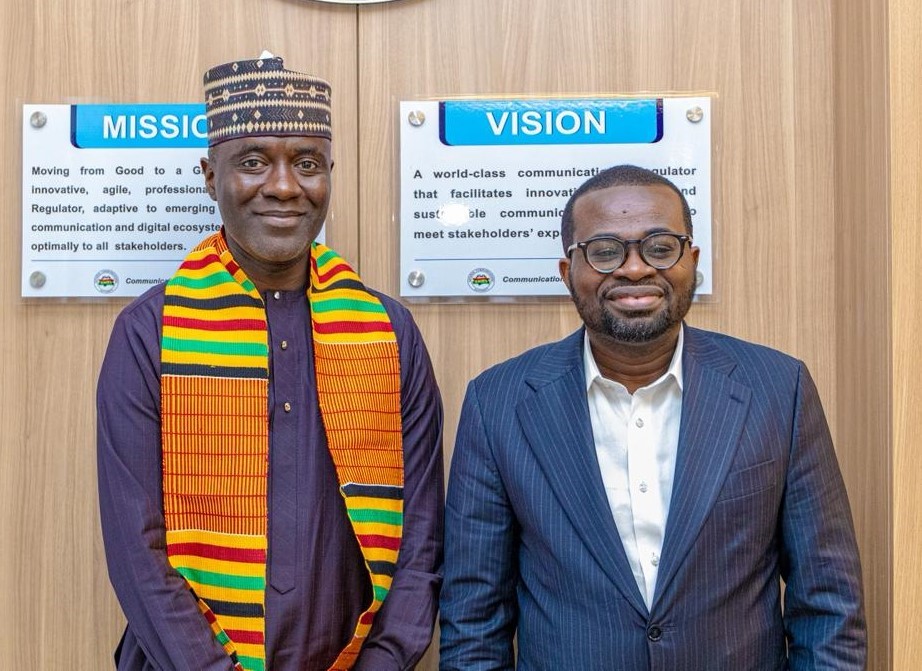
L-R: Executive Vice Chairman/ Chief Executive Officer, Nigerian Communications Commission (NCC), Dr. Aminu Maida and Ag. Director General, National Communications Authority (NCA), Ghana, Edmund Fianko, during a benchmarking visit of the NCC to the NCA in Ghana recently.
NCC, NCA Strengthen Telecom Regulatory Ties to Boost West African Digital Economy
The Nigerian Communications Commission (NCC) and Ghana’s National Communications Authority (NCA) have pledged to enhance bilateral cooperation in telecommunications regulation following a high-level two-day visit by an NCC delegation to Ghana.
Led by NCC Executive Vice Chairman/CEO Dr. Aminu Maida, the engagement aimed to foster cross-border regulatory alignment, knowledge sharing, and regional harmonization in line with global standards.
During the bilateral meeting at the NCA Tower in Accra, both regulators discussed critical areas such as Quality of Service (QoS) monitoring, consumer protection, telecom infrastructure security, and cybersecurity—key pillars for building robust and innovation-friendly telecom sectors.
NCA Acting Director-General Rev. Ing. Edmund Yirenkyi Fianko, who took office in January 2025, welcomed the NCC team and stressed the importance of sustained collaboration between Ghana and Nigeria.
“As regional leaders, we must continue to set benchmarks on the international stage,” Fianko stated.
“Ghana is keen to partner with Nigeria on ECOWAS Roaming, cross-border regulatory oversight, and capacity-building initiatives to drive regional integration.”
He highlighted the significance of collaboration, given the substantial trade and traffic between the two nations.
Dr. Maida commended the NCA’s regulatory advancements, particularly in real-time monitoring and addressing market dominance.
“We are here because of Ghana’s impressive regulatory infrastructure and innovation. Nigeria is eager to collaborate on ECOWAS Roaming and learn from Ghana’s expertise,” he said.
The NCC delegation toured the NCA’s state-of-the-art facilities, including the Communications Monitoring Centre (CMC), Network Monitoring System, and the Common Platform—a revenue assurance tool that enhances transparency in Ghana’s telecom sector.
Both regulators also shared key achievements. The NCC highlighted Nigeria’s NIN-SIM integration policy, Incident Reporting Platform, Tariff Simplification Framework, and the classification of telecom infrastructure as Critical National Information Infrastructure (CNII), all of which have strengthened consumer protection and regulatory efficiency.
The NCA, meanwhile, emphasized its focus on regulatory innovation, data-driven oversight, and stakeholder engagement, which have improved compliance and service quality in Ghana’s telecom industry.
To further continental collaboration, Dr. Maida invited Ghana to join the African chapter of the International Institute of Communications (IIC), currently in development.
The visit concluded with both regulators committing to joint initiatives, technical cooperation, and ongoing knowledge exchange. This partnership sets a strong precedent for unified telecom regulation in West Africa, advancing the shared goal of inclusive, secure, and consumer-centric digital economies.
Ghana currently has ECOWAS Free Roaming agreements with Côte d’Ivoire, Togo, and Benin, with pilot arrangements underway in The Gambia.
